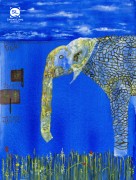The story is one very complex sentence! Few writers would dare such a thing. What inspired you to do it and what were some of the challenges involved?
My mind tends to spin long strings of thought, and sometimes it’s harder for me to write succinct sentences than a run-on like in this piece! So really, all I had to do was let my freak flag fly, in keeping with this freaky narrator, whose mind and body travel all over the place without anchor or pause. The long sentence attempts to capture the energy of the narrator’s experience rather than just describe it. The main challenge, of course, was maintaining clarity: I tried to make the sentence more digestible through judicious use of commas and the occasional em-dash.
You write both fiction and nonfiction. How do you decide what becomes which?
Fiction is my default mode. I mainly write full-on nonfiction when I feel I have no choice, when the only way to do the topic justice is through a “this really happened” framework. Usually I’m working out something that I can’t by other means: I try to bring that sense of discovery to the page. Nonfiction lends itself well to foregrounded ideas and themes, though fiction can foreground them too: some of my writing walks the line between fiction and nonfiction and what I end up calling it depends on whether it’s published as fiction or nonfiction. I never try to pass off blatant fiction as nonfiction, but I’ve definitely submitted nonfictionish pieces as fiction.
It strikes me that this brief story with its repeated images and condensed language has the feel of a poem. Is that by design?
The repeated images and condensed language are by design, but if my prose achieves the feel of a poem, that’s just a happy accident! Though I love poetry and occasionally write it, it’s not my forte. Still, I do invite a quasi-poetic sensibility into my prose. Especially with flash, I try to compress the language as much as I can. And in this piece, the repeated images serve as touchstones amid the mental chaos, and also, I think, impart an anxious obsessiveness.
This story is quite short, of course, around seven hundred words. Yet it does this wonderful, magical thing–it expands. There’s a sense of a history, of universes far beyond, of a world of experience. How did you create this effect?
This goes back to your first question: in allowing my mind to do its thing, to wander freely through my imagination and psyche, I was able to access more material than if I’d taken a linear, clipped approach. Too much interiority can enervate fiction, but I’m a big fan of interiority done well. When the mind goes deep enough, it also goes wide.
Memory—often sharp and specific, often vague and dreamlike—looms large here. In some ways, I’m reminded of Ishiguro, particularly The Unconsoled. What inspired “In Darkest Sky”? What’s the role of memory in this story?
“In Darkest Sky,” like many of my flashes, was inspired by a dream: I was in a hotel room, packing clothes in a paper bag, and the clothes kept disappearing inside it. The feeling of that dream stuck with me, so I took that central image and built a story around it.
The role of memory in “In Darkest Sky” is complex; I’m not sure I can unpack it (no pun intended). But there’s a connection between memory and identity, memory loss and rootlessness. For the narrator, memory is a trickster and a burden and a guide, embodied by the confounding yet comforting presence of the dead grandmother. And this narrator likes to flaunt her difficult relationship to memory: she performs it and, perhaps, hides behind it.



 Included in the price of SmokeLong Fitness:
Included in the price of SmokeLong Fitness: